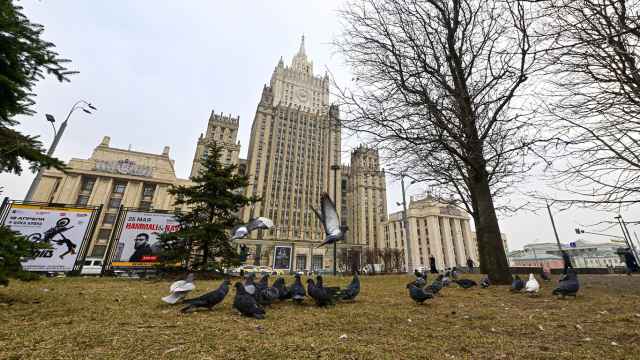U.S. broadcaster CNN expressed bewilderment Tuesday over the appearance of a web site bearing its iconic red logo and poorly translated articles in Russian.
The web site, Cnnrussia.ru, is attracting thousands of visitors a day and sponsors Facebook, Twitter and LiveJournal communities as well.
CNN Moscow bureau chief Maxim Tkachenko said the broadcaster does not have a Russian-language web site.
Claudia Coles, a London-based spokeswoman for CNN, said the broadcaster was looking into the matter. "I can confirm this is not a CNN site. We are evaluating next steps," Coles said by e-mail.
The identity of the site's owners could not be established immediately.
Whois Service, an online database of domain name owners, says the site is owned by an unidentified private individual who registered the domain name through Reg.ru, which claims on its home page to be "Russia's biggest accredited domain registrar."
An e-mail sent to Reg.ru went unanswered.
According to Whois Service, Cnnrussia.ru was registered in mid-May by an unspecified "private individual" who paid for rights to the domain name for a year. Oddly, a copyright notice on Cnnrussia.ru shows the years 2009 to 2010.
News articles posted on the site are filled with gibberish, reminiscent of text run through an automatic translation program. The articles contain spelling errors and unintentional obscenities, many of which are unprintable in a family newspaper. In one of the more tame examples, one described Dominique Strauss-Kahn, the embattled former managing director of the IMF, not as "IMF head" (golova) but as "IMF glans penis" (golovka).
The articles do not appear to be lifted from CNN because their content differs from the CNN stories that are cited as sources.
The web site is regularly updated and listed more than 6,000 daily visitors as of Tuesday afternoon.
In a possible clue to the whereabouts of the site's owner, the unidentified person who registered Cnnrussia.ru's LiveJournal page listed his location as the city of Ivanovo, some 300 kilometers northeast of Moscow.
The LiveJournal community has 300 readers and the Twitter blog has 180 followers. The unidentified manager of the Twitter blog wrote in his debut post that the audience was built up through the use of Tweetbooster.net, a commercial service that sells Twitter followers for 1 cent per user.
The purpose of the web site was unclear. Cybersquatters have been known to take over the domain names of companies, state agencies and celebrities. U.S. camera maker Eastman Kodak won a costly, two-year legal battle for the rights to Kodak.ru in 1999, while Forbes magazine won a similar lawsuit over Forbes.ru last year.
CNN has the right to seek a court order to close the web site because it violates two laws: a company's exclusive right to its name and the illegal use of a trademark, said Alina Topornina, a lawyer with Yukov, Khrenov & Partners.
A guilty verdict over the name violation would carry no fines for Cnnrussia.ru's owners unless CNN proved in court that it had suffered financial damage because of the site, Topornina said by telephone.
Trademark violations are punishable with fines of 2,000 rubles to 40,000 rubles ($70 to $1,400), depending on whether the infringer is a private individual, a state official or a legal entity.
A Message from The Moscow Times:
Dear readers,
We are facing unprecedented challenges. Russia's Prosecutor General's Office has designated The Moscow Times as an "undesirable" organization, criminalizing our work and putting our staff at risk of prosecution. This follows our earlier unjust labeling as a "foreign agent."
These actions are direct attempts to silence independent journalism in Russia. The authorities claim our work "discredits the decisions of the Russian leadership." We see things differently: we strive to provide accurate, unbiased reporting on Russia.
We, the journalists of The Moscow Times, refuse to be silenced. But to continue our work, we need your help.
Your support, no matter how small, makes a world of difference. If you can, please support us monthly starting from just $2. It's quick to set up, and every contribution makes a significant impact.
By supporting The Moscow Times, you're defending open, independent journalism in the face of repression. Thank you for standing with us.
Remind me later.





